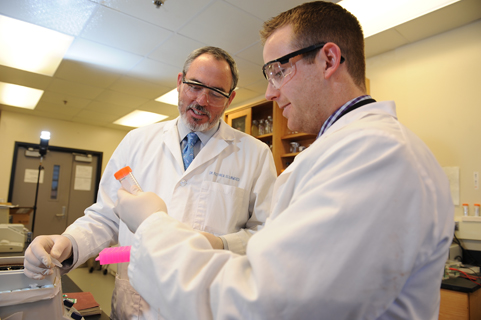
Preparing Future Scientists
The management and care of research animals is a necessary, behind-thescenes aspect of scientific study that animal scientist Matthew Ellinwood has made a learning experience for undergraduates.
“We take seriously the role these dogs and cats play in addressing new treatments or possibly cures for conditions that have a big, negative impact on people, especially children,” he says.
After earning his doctoral and veterinary degrees, Ellinwood became a researcher at the University of Pennsylvania. Part of his duties was the management of dogs and cats used to research human genetic diseases—most of them fatal pediatric diseases. Graduate students did a lot of the work, offering valuable hands-on experience. Ellinwood brought this model of students caring for animals to Iowa when he started at ISU about seven years ago.
About 18 undergraduates per semester provide animal care and management and two or three conduct lab work, such as molecular diagnostics, routine biochemistry and inventory management. Led by Ellinwood, the team looks for answers behind what causes human diseases like glaucoma, the leading cause of blindness world wide.
Nearly all the students have a pre-vet or pre-med focus. Most are animal science students, but there are also those majoring in animal ecology and biology. The work offers an especially good experience for pre-vet students who plan to concentrate on small animals.
Some students get involved for research experience, others because they enjoy animal care and management. Whatever the goal, they find a unique environment for learning.
“Dr. Ellinwood not only created an opportunity for students to learn basic medical care of companion animals, he’s given us the opportunity to think on our feet, be attentive to detail and apply what we’ve learned in other classes to what we’re studying in the research colony,” says Allie Ludwig, a sophomore in preveterinary animal science.
Lucas Carlstrom (’08 animal science) was another of Ellinwood’s students. While working in Ellinwood’s lab he was first author on one research manuscript and co-author on another—quite an accomplishment for a student, let alone an undergraduate.
He credits that experience for being accepted into the highly competitive combined medical doctor and doctoral Medical Scientist Training Program at the Mayo Clinic: College of Medicine, where he is engaged in molecular neuroscience and spinal cord regeneration research.
Spending time in a research setting allowed Carlstrom to develop self-guided problem analysis and advanced critical thinking skills. “These valuable training experiences enhanced my intellectual curiosity and afforded me the opportunity to solve relevant biomedical research questions that will hopefully improve human health and alleviate disease,” he says.
“The undergraduates we get are top-tier who I would put up against students at any other institution,” Ellinwood says. “They are certainly as skilled and bright, but they also have the traditional values of Midwest farm kids, that you may not see as often at other schools.”
Ellinwood says it’s important to challenge these talented students with real-world problems and to show them they can make a difference.
“Regardless of where they go, I hope they come out of my program with a heightened sense of achievement and accomplishment.”



